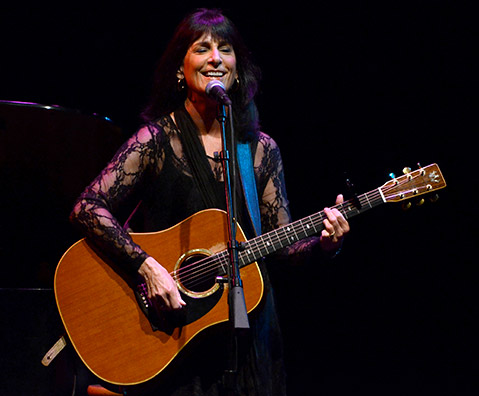Karla Bonoff Reflects On Times Present and Past
Revered Folk-Rock Singer/Songwriter Plays Lobero August 18

Life has mellowed out for Karla Bonoff, who plays the Lobero Theatre Thursday, August 18. Since moving to Santa Barbara almost 20 years ago, Bonoff’s relocation has coincided with a growing sense of ease and comfort with herself, her songs, and the pace at which they come. Bonoff came here from her birthplace of L.A. in 1997, having gotten to know the town from visiting as a child and from recording her third album, Wild Heart of the Young. “It was just a place I loved and could always picture myself being in, and it’s not too far away … it’s the perfect answer to get out of the urban nightmare,” she said. Music-going comes by easier than it did back then, too, she said — she’s seeing way more live music here than in L.A.
Her re-rooting reflects an inner transition toward a greater self-acceptance and contentedness with things. Santa Barbara hasn’t necessarily been any better or worse for her songwriting, she said, because for her, “the songwriting issues that I have are more internal. It’s more about whether I’m just feeling like writing music or not. I think I’ve come to terms with the fact that I’m just not a really prolific writer,” she continued. “Now that I’m not really under pressure from major labels, I understand I’m not someone who writes a lot. I’ll never be someone who writes 200 songs; it’s just my own process. Some people don’t feel good if they’re not writing or working, but it’s really easy for me to go weeks without writing and not even feel a bit.”
For Bonoff, it’s been a matter of quality, not quantity. Whether with her own singing or through the voices of others, her brilliant and powerful, quiet storm ballads, such as “All My Life,” “Someone to Lay Down Beside Me,” and “Home,” have become classics of the folk-rock and adult contemporary realms, accompanying wedding dances, late-night tear-duct drains, and innumerable otherwise tender or soul-searching moments for years. Although, frustratingly, many initially mistook renditions by Linda Ronstadt and Bonnie Raitt as originals, Bonoff feels nonetheless honored to have been sung by the likes of them. “Without [Ronstadt and Raitt] doing those songs, there’s no way I would have had the success I had, because it brought so much attention to me,” she said. “It’s such a thrill — at this point I feel so lucky to have been part of that group of women.”
These days, though, Bonoff is less concerned about how the songs come across. “I was kind of a more timid performer then. I wasn’t always that comfortable. Now there’s nothing to lose,” she said. “When I was younger, I was trying to prove that I was a good songwriter, and I would work at it — there was that hunger you have in your twenties and thirties to sort of establish yourself,” she said. “When you grow up, you care less about what people think. It makes everything easier to appreciate your own process. Being able to be in the moment for me has become a lot easier.”
There is, of course, some nostalgia for the freely expressive days of the ’60s and ’70s when music culture was less corporatized. “I feel like when we were all there in the moment, we didn’t really quite realize how incredibly cool that was,” she said. “In retrospect, being able to be a young, up-and-coming musician in those days was so incredible — there was so much opportunity and so much creativity, and record companies would let you develop your artistry. We were so fortunate to be musicians then.”
The music she and others from the Troubadour scene made in those years has left a permanent imprint on the hearts and minds of many since. Generations of fans have told Bonoff that her music was the soundtrack to their lives or that it served as a healing hand in a time of divorce or even that her name was the inspiration for their child’s name. “I feel like I left some kind of stamp on the world, and that’s pretty wonderful,” she said.
4∙1∙1
Karla Bonoff plays Thursday, August 18, at 8 p.m. at the Lobero Theatre (33 E. Canon Perdido St.). Call (805) 963-0761 or visit lobero.com.



